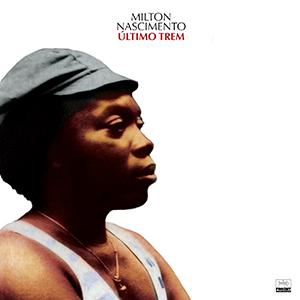After a vinyl version of 'Maria Maria', Milton Nascimento's first ballet from 1976, was released at the end of last year, it seemed only logical that 'Ultimo Trem' would follow. The success of 'Maria Maria' made Nascimento decide to compose another ballet with Fernando Brant in 1980.
This time the duo drew inspiration by the forced closure of a railroad line that connected several villages and cities in the northeast of Minas Gerais with the east coast of Brazil; a ballet that was fittingly titled 'Ultimo Trem': "The military government shut down the route and the whole region began to fade away. I love train rides, but today there are almost no trains in Brazil, so when I go to the US and Europe, any time I can, I go by train. The longer the journey the better.". The whole story is summarized in the intro of the album, 'Abertura: Mina'.
The musical line-up for this album was similar to that of 'Maria Maria', and once again features Nana Vasconcelos on percussion, João Donato on keyboards and percussion, and Paulo Jobim, son of Brazilian music legend Antonio Carlos Jobim, on guitar.
In title track 'Ultimo Trem' you'll hear the voice of Zezé Motta accompanied by a choir and piano, in a lament about the closing of the line. At the time, the ballet caused a lot of media attention for the closure of the railroad, something that was not at all to the liking of the military dictatorship holding the country in an iron grip.
The musical thread running through the compositions on 'Ultimo Trem' is Milton's and Fernando's shared passion for the sounds, smells and memories of old trains. Thus 'A Viagem (The Trip)' opens with the sound of a steam flute - also heard at the end of 'Bicho Homen' - and Milton imitating the cadence of a moving train on his guitar (a similar effect was achieved in 'Povo da Raça' using a drum rhythm).
Tracks like 'E Dai? (And So What? )' and 'Olho d'Agua (Water's Eye)' were already featured on 1972's 'Clube Da Esquina', but without a doubt the most memorable song from the track list is closing track 'Ponto De Areia (Sand Edge)', that would go on to become one of Nascimento's most famous songs, and would subsequently be covered by Wayne Shorter and Earth, Wind & Fire (an alternative version with Naná Caymmi on vocals and introduced by the sound of a departing steam train, is featured elsewhere in the track list).
If 'Maria Maria' was your cup of tea, definitely don't ignore 'Ultimo Trem', as this album is definitely another true gem from Nascimiento's discography!


